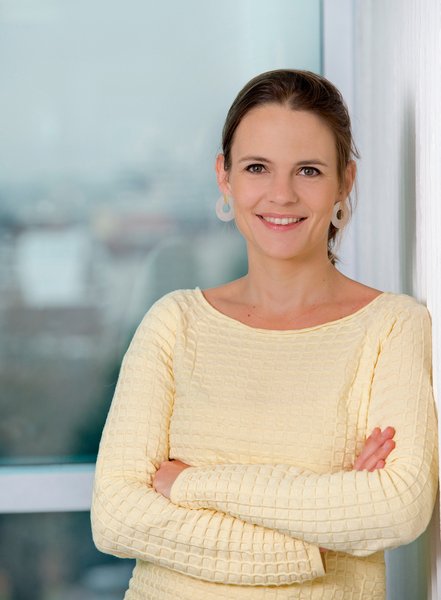Two DKFZ researchers honoured with German Cancer Prize

Press release of the German Cancer Research Center (Deutsches Krebsforschungszentrum, DKFZ)
Michaela Frye and Lena Maier-Hein, both from the German Cancer Research Centre (DKFZ), have been awarded the German Cancer Prize 2024 for their excellent work in cancer medicine and research. The prize from the German Cancer Society and the German Cancer Foundation is one of the highest honours in oncology.
The German Cancer Prize has been awarded annually since 1986 in equal parts in the categories of experimental, translational and clinical research for outstanding work in German-speaking countries. Each category is endowed with 7,500 euros. The German Cancer Society and the German Cancer Foundation are the sponsors of the German Cancer Prize.
Novel therapeutic strategies based on RNA modifications
In the "Experimental Research" category, Michaela Frye, head of the "Regulatory Mechanisms of Gene Expression" department at the DKFZ, has been awarded the German Cancer Prize for her pioneering research into chemical RNA modifications that contribute to the development of cancer, metastasis and resistance to therapy. Frye's working group is the leading group in this field of research. For example, Frye demonstrated for the first time that mutations in RNA-modifying enzymes can cause disease. She discovered new biological mechanisms that are fundamental to tumour development and resistance to chemotherapy.
Among other things, Frye's team showed that specific RNA modifications in mitochondria - cell organelles that are also known as the power stations of the cell - play a significant role in the formation of metastases. Aggressive, metastatic cancer cells use mitochondria to dynamically adapt their energy metabolism to new cellular environments. Mitochondrial RNA modifications promote the spread of cancer cells by driving protein synthesis and thereby increasing the metabolic flexibility of aggressive, invasive and metastatic head and neck cancers. Inhibitors of mitochondrial RNA modifications could therefore represent a new treatment concept against the development of metastases.
New methods of AI-supported imaging in oncological surgery
This year's Cancer Prize winner for Translational Research, Lena Maier-Hein, has developed pioneering methods for AI-based imaging in oncological operations. The computer scientist heads the Department of Intelligent Medical Systems at the DKFZ and is a managing director of the National Centre for Tumour Diseases (NCT) in Heidelberg. Maier-Hein is a professor at both the Faculty of Medicine and the Faculty of Mathematics and Computer Science at Heidelberg University.
Her research plays a key role in ensuring that oncological surgery not only depends on the surgeon's excellent individual expertise, but that AI is also increasingly used to good effect. Lena Maier-Hein's AI-based methods have created a new type of intraoperative imaging that visualises both the structure and function of tissue in real time. The use of AI will optimise processes during surgery and improve the quality of treatment for cancer patients. Furthermore, their work on the clinically relevant validation of AI algorithms has set new standards in translational medical image processing research.
The prize in the Clinical Research category goes to Claus Rödel, Director of the Department of Radiotherapy and Oncology at the University Hospital of Goethe University Frankfurt, for his internationally acclaimed studies on optimising the treatment of rectal cancer. The special prize for healthcare research goes to Stephanie Stock for her pioneering work on strengthening patient-centredness and increasing the skills of nursing staff in oncological care.
Image description
Prof. Dr. Lena Maier-Hein, Managing Director at the NCT Heidelberg.
German Cancer Research Center (DKFZ)
With more than 3,000 employees, the German Cancer Research Center (Deutsches Krebsforschungszentrum, DKFZ) is Germany’s largest biomedical research institute. DKFZ scientists identify cancer risk factors, investigate how cancer progresses and develop new cancer prevention strategies. They are also developing new methods to diagnose tumors more precisely and treat cancer patients more successfully. The DKFZ's Cancer Information Service (KID) provides patients, interested citizens and experts with individual answers to questions relating to cancer.
To transfer promising approaches from cancer research to the clinic and thus improve the prognosis of cancer patients, the DKFZ cooperates with excellent research institutions and university hospitals throughout Germany:
- National Center for Tumor Diseases (NCT, 6 sites)
- German Cancer Consortium (DKTK, 8 sites)
- Hopp Children's Cancer Center (KiTZ) Heidelberg
- Helmholtz Institute for Translational Oncology (HI-TRON Mainz) - A Helmholtz Institute of the DKFZ
- DKFZ-Hector Cancer Institute at the University Medical Center Mannheim
- National Cancer Prevention Center (jointly with German Cancer Aid)
The DKFZ is 90 percent financed by the Federal Ministry of Education and Research and 10 percent by the state of Baden-Württemberg. The DKFZ is a member of the Helmholtz Association of German Research Centers.
Contact for the press:
Dr. Sibylle Kohlstädt
German Cancer Research Center (DKFZ)
Strategic Communications and Public Relations
Im Neuenheimer Feld 280
69120 Heidelberg
P: +49 6221 42 2843
F: +49 6221 42 2968
E-mail: S.Kohlstaedt(at)dkfz.de
E-mail: presse(at)dkfz.de
www.dkfz.de







